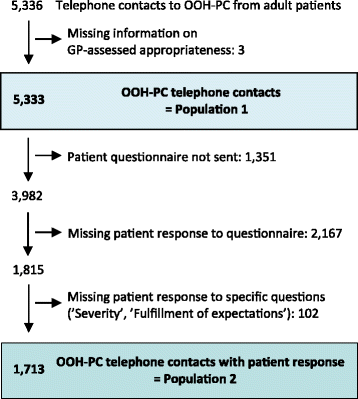Medical appropriateness of adult calls to Danish out-of-hours primary care: a questionnaire-based survey
- PMID: 28292257
- PMCID: PMC5351208
- DOI: 10.1186/s12875-017-0617-1
Medical appropriateness of adult calls to Danish out-of-hours primary care: a questionnaire-based survey
Abstract
Background: Optimal utilisation of the out-of-hours primary care (OOH-PC) services remains a concern in public health policy. We need more knowledge on potentially avoidable contacts. This study examines the frequency of medically assessed inappropriate OOH-PC calls from adults, explores factors associated with such assessment, and examines the relation to patient-assessed severity of health problem and fulfilment of expectations.
Methods: We performed secondary analyses of data from a large cross-sectional survey on contacts to Danish OOH-PC. As access to Danish OOH-PC is provided through telephone triage delivered by a general practitioner (GP), we included only telephone contacts. A contact was characterised as medically inappropriate when the triage GP assessed that the request from a medical perspective should have been directed to daytime primary care. Appropriateness was examined in relation to patient characteristics, reason for encounter, time of contact, and whether the contact was triaged to a face-to-face consultation, and in relation to patient-assessed severity of the health problem and fulfilment of expectations. Associations were estimated with odds ratios (ORs) using multivariate analysis.
Results: Of all contacts, 23.7% were assessed as medically inappropriate. Such assessment was associated with: younger age, longer symptom duration, exacerbation of chronic condition, and contact only few hours away from own GP's office hours. Of medically inappropriate contacts, 31.3% were from patients aged 18-30 years, 41.5% concerned symptoms of > 24 h, 19.4% concerned exacerbation of chronic condition, and 21.3% were calls < 3 h away from own GP's regular office hours. Medicine request was the most frequent reason for an inappropriate contact (14.3% of medically inappropriate contacts). In 53.4% of contacts assessed as inappropriate, the health problem was considered as severe by patients and medical assessed inappropriateness was significantly associated with unfulfilled patient expectations.
Conclusions: One in four OOH-PC calls was considered medically inappropriate. Future efforts to reduce suboptimal use of OOH-PC should focus on the types of contacts with the highest optimisation potential, e.g., medication requests, long-lasting symptoms, and exacerbations. Such interventions should aim at bridging the gap between the GP's medical assessment and the patient's expectations to appropriate OOH-PC use.
Keywords: After-hours care; Delivery of health care; Denmark; Health care seeking behaviors; Health care utilisation; Primary health care.
Figures
References
MeSH terms
LinkOut - more resources
Full Text Sources
Other Literature Sources
Research Materials
Miscellaneous


